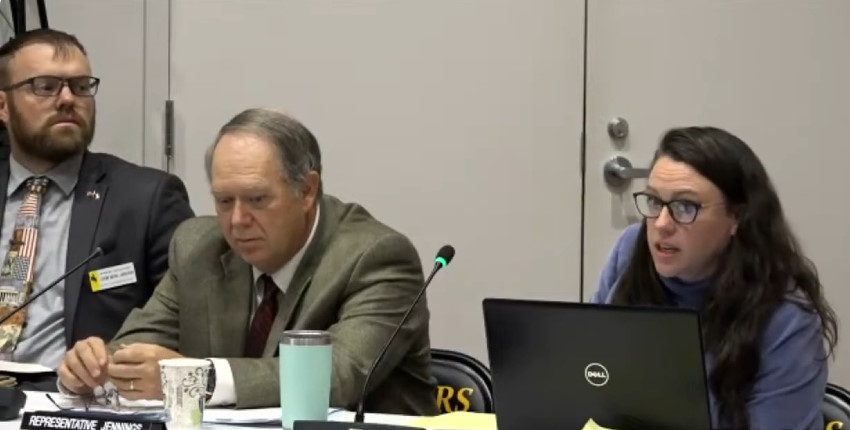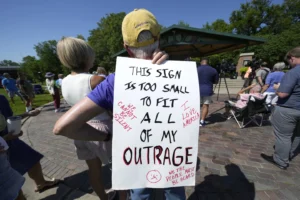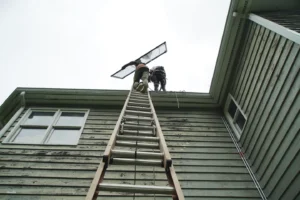Lawmakers Propose Tightening and Relaxing Some Sex Offender Requirements
Committee recommends changes following public input
- Published In: Politics
- Last Updated: Nov 14, 2023

The Wyoming Legislature’s Joint Judiciary Committee is proposing several tweaks to the state’s sex offender laws, including two changes inspired by public comments. (Courtesy photo from the Wyoming Legislature via YouTube)
By CJ Baker
Special to the Wyoming Truth
After hearing impassioned pleas from a victim and an offender, Wyoming lawmakers are proposing to tighten one part of the state’s sex offender registration laws while slightly loosening another. Rep. Jeremy Haroldson (R-Wheatland) perhaps summarized the philosophy the best, saying his hope is to “make sure that we are properly protecting but yet at the same time not unjustly doing.”
The potential changes are part of the Joint Judiciary Committee’s broader effort to clean up the complex statutes related to Wyoming’s sex offender registry; the committee took on the topic after a lawmaker’s proposal to tighten the requirements drew significant confusion last winter.
Individuals convicted of most sex-related crimes in Wyoming are required to register as an offender, with their address, vehicles and other personal information posted on a public registry. Offenders generally must register for life, but for not-as-severe crimes, they can ask a judge to be relieved of the requirement after 10 or 25 years of good behavior.

Over 2,500 men and women are currently listed on Wyoming’s registry. The list is intended to serve as a protective rather than a punitive measure, and although their efficacy is uncertain, such registries are generally popular.
Targeting a ‘loophole’
At the judiciary committee’s Sept. 19 meeting, a college student from West Virginia expressed concern that her former youth pastor — who served prison time for sending sexually explicit messages to her and others in 2015 and 2016 — didn’t have to register as a sex offender when he moved back to Wyoming.
Now a student at Marshall University, Maddi Morgan said she was 12 when her then-pastor contacted her on social media, posing as a 16-year-old boy. She said he sent “nude photos and videos of himself performing obscene acts,” along with sexual messages. At the time of his arrest in 2016, the man was 30 years old.
“… Everyone needs to hold him accountable for what he did,” Morgan told the panel, saying she was “trying to look out for potential victims” in Wyoming.
She also warned that, “if he found a loophole and that he could move away from the state where he was convicted, that there are others that have done this same thing.”

In West Virginia, distributing or displaying obscene matter to a minor is a felony crime, punishable by up to five years of prison time and at least 10 years of sex offender registration, according to legislative staff. Wyoming classifies that conduct as a misdemeanor, punishable by no more than a year in jail with no requirement to register.
Last week, however, the Judiciary Committee voted 11-3 to sponsor legislation that would make promoting obscenity to a minor a registerable offense. Under the draft bill, a person convicted of the crime (or an equivalent offense in another state) would have to register for at least 25 years.
Lawmakers can make the requirement apply retroactively — potentially including Morgan’s former pastor — but Allison Moore of the Wyoming Division of Criminal Investigation cautioned the state would have no surefire way to identify every qualifying offender who’s moved to Wyoming.
Seeking relief
Meanwhile, a former Wyoming resident argued the state is imposing unfair and unconstitutional requirements on those convicted of one type of third-degree sexual abuse of a minor.
Wyoming law requires a lifetime registration if the victim was 16 or 17 and the defendant was 20 or older and occupied “a position of authority” over the victim; that can include a teacher having sex with a student. The crime is included with the most serious offenses, like forcible rape, even though some second-degree offenses involving 13- to 15-year-old victims are classified as less severe. As a result, Jeff Hanson said he and others convicted of the third-degree crime must check in with law enforcement four times a year for the rest of their lives, while some who victimized younger children only do so twice a year and can be removed from the registry after 25 years.
At the committee’s Nov. 7 meeting, he argued the set-up is arbitrary and “incentivizes offenders for choosing younger victims.”
“None of these offenders are denying the seriousness of their crime nor the need to register for a period of time,” said Hanson, who was convicted in 2009. “They’re simply imploring to be protected equally by Wyoming’s laws.”

Committee Co-Chair Rep. Art Washut (R-Casper) agreed the current classification seems “inequitable.” Co-Chair Sen. Bill Landen (R-Casper) added that, even if it’s tough, “if we need to make it right, then we ought to make it right.”
But Rep. Ember Oakley (R-Riverton) expressed ambivalence about relaxing the requirements; the Fremont County prosecutor referenced a recent case that involved a 50-year-old man and 16-year-old girl.
“[The teen] very much feels that she was taken advantage of and it changed her life and that she’s a victim of sex assault,” Oakley said. She wondered if the Legislature should instead require quarterly, lifelong registration for offenses involving younger victims.
The panel eventually approved an amendment proposed by Sen. Cale Case (R-Lander). It would allow those convicted of the third-degree offense to move to twice-annual registration and let them petition a judge for removal from the list after 25 years – but only in cases where the 16- or 17-year-old victim and the offender were less than eight years apart.
“Older males, I definitely don’t want to cut any slack on,” Case said.
The tweak was incorporated in a broader set of proposed changes to Wyoming’s sex offender laws. The committee unanimously backed the bill, which would remove obsolete language and add registration requirements for those convicted of sexual servitude of an adult (minimum registration of 10 years), sexual servitude of an adult (25 years) and first- and second-degree human trafficking (life).
The panel also decided it did not want to add felonious restraint and false imprisonment of minors to the list of registerable offenses. Given the crimes don’t involve sexual misconduct, “it just seems to cast too wide of a net,” Oakley said.
The committee’s bills will be considered by the full Legislature during February’s Budget Session.













